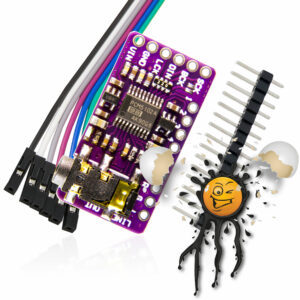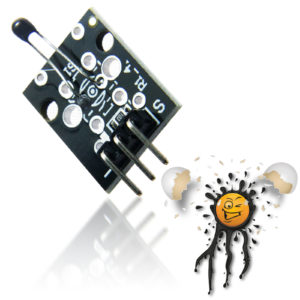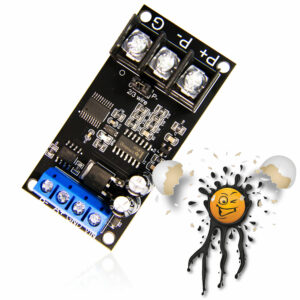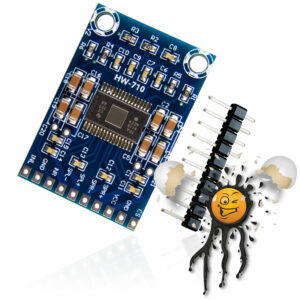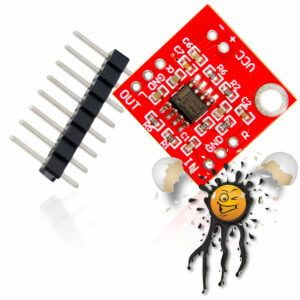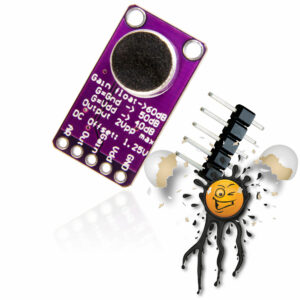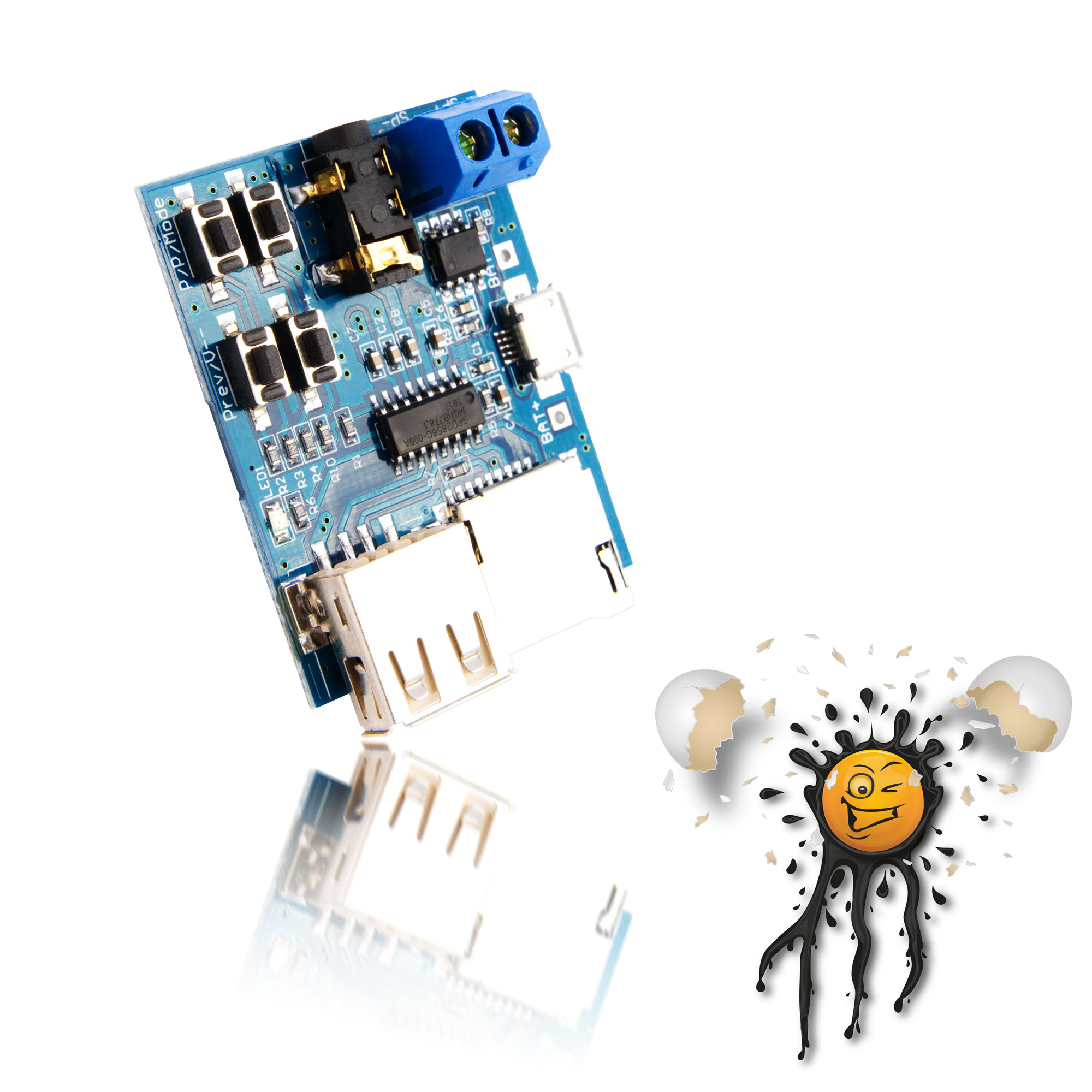|
UART Voice Sound Recorder JQ6500 © androegg

JQ6500 Recorder Play Back Module © androegg
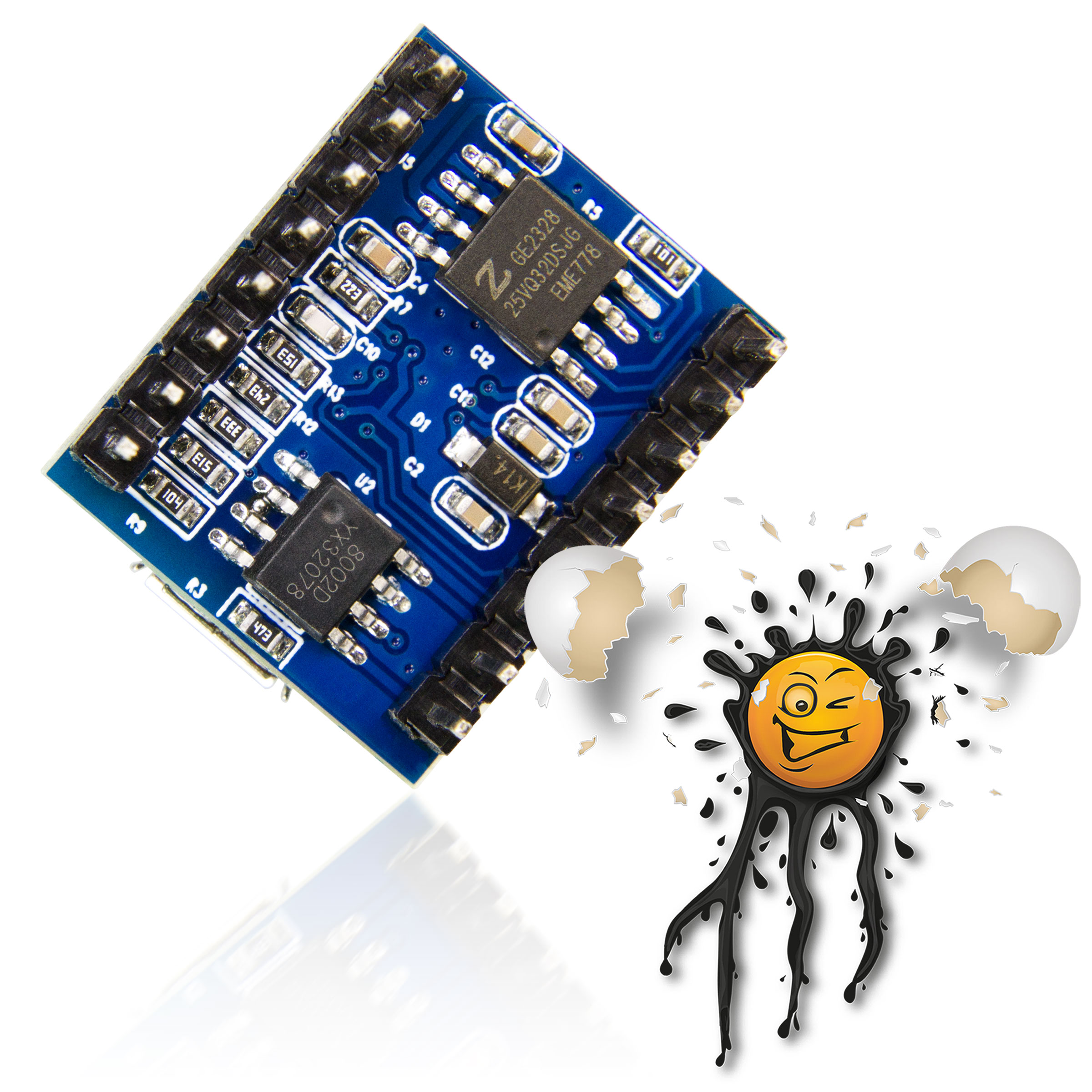
|
|
Das Sprache Sound Rekorder Modul basiert auf dem JQ6500 und erlaubt Sprache / Audio aufzuzeichnen als auch wiederzugeben.
Im Vergleich zu anderen Sprach Modulen verfügt der JQ6500 über einen 24bit DAC (Digital Analog Converter).
Je nach Audio Qualität, als auch SPI Flash Speichergröße, speichert das JQ6500 Modul Sprachsignale mit einer Länge von 252 Sekunden (16Mbit 16Kbps sampling Rate).
Das JQ6500 Modul unterstützt MP3 Formate von
- 8
- 11,025
- 12
- 16
- 22,05
- 24
- 32
- 44,1
- 48
KHz.
USB Sprach Audio Modul
Neben der direkten Benutzereingabe über Pin / Taster unterstützt das JQ6500 auch die direkte Funktionssteuerung über die UART / RX / TX serielle Schnittstelle. Dabei ist zu beachten die UART Schnittstelle ist nicht 5V tollerant dementsprechend muss beispielsweise ein 1KΩ Widerstand zwischen JQ6500 RX Pin und TX Pin einer 5V MCU geschaltet werden.
Es gibt derzeit einige Bibliotheken die eine direkte UART Kommunikation ermöglichen, bzw. das nachfolgende UART Protokoll implementieren. |
The Voice Record Module is based on JQ6500 IC, a multiple‐message record/playback device.
Compared to other voice modules, the JQ6500 has a 24bit DAC (Digital Analog Converter).
Depending on the audio quality and SPI flash memory size, the JQ6500 module stores voice signals with a length of 252 seconds (16Mbit 16Kbps sampling rate).
The JQ6500 module supports MP3 formats
- 8
- 11,025
- 12
- 16
- 22.05
- 24
- 32
- 44.1
- 48
- KHz.
USB Voice Audio Modul
In addition to direct user input via pin/button, the JQ6500 also supports direct function control via the UART/RX/TX serial interface.
It should be noted that the UART interface is not 5V tolerance, so a 1KΩ resistor must be connected between the JQ6500 RX pin and TX pin of a 5V MCU.
There are currently some libraries that enable direct UART communication or implement the following UART protocol. |
JQ6500 serial protocol
The device (appears to) accepts commands at any time. Commands consist of 4 or more bytes,
- Each command starts with byte 0x7E
- Followed by a byte indicating the number of bytes which follow including the terminating byte (including termination)
- Followed by a byte indicating the command to execute
- Followed by an optional first argument byte
- Followed by an optional second argument byte
- Followed by the byte 0xEF as the termination byte
For example, the command ”PLAY” (0x0D) is constructed with the following 4 bytes
- 0x7E – Start Byte
- 0x02 – 2 Bytes Follow
- 0x0D – Command Byte
- 0xEF – Termination Byte
Example to play a specific file (0x012) has two arguments in detail folder number and file number
- 0x7E – Start
- 0x04 – 4 Bytes Follow
- 0x12 – Command
- 0x02 – 1st Argument (in this case, “Folder 02”)
- 0x03 – 2nd Argument (in this case, “File 003”)
- 0xEF – Termination Byte
| command |
function |
description |
| 0x0D |
Play |
no arguments |
| 0x0E |
Pause |
no arguments |
| 0x01 |
Next |
no arguments |
| 0x02 |
Prev |
no arguments |
| 0x03 |
Play file by index number |
2 Arguments. The index number being the index in the FAT table, or upload order. Argument 1 = high 8 bits of index number, Argument 2 = low 8 bits of index number |
| 0x0F |
Change folder |
1 Argument. Argument 1 = 0x01 for Next Folder, 0x00 for Previous Folder. |
| 0x12 |
Play file by folder and name |
2 Arguments. This applies to SD Card only where you have folders named 01 through 99, and files in those folders named 001.mp3 through 999.mp3. Argument 1 = folder number, Argument 2 = file number. Note that arguments are a single byte, so effectively I think you can only access up to file 255.mp3 in any folder |
| 0x04 |
Vol up |
no arguments |
| 0x05 |
Vol down |
no arguments |
| 0x06 |
Set Vol |
1 Argument. Argument 1 = byte value from 0 to 30 |
| 0x07 |
Set Equilizer Mode |
1 Argument. Argument 1 = byte value 0/1/2/3/4/5 for Normal/Pop/Rock/Jazz/Classic/Bass (actually “Base” in the datasheet but I think they mean Bass) |
| 0x11 |
Set Loop Mode |
1 Argument. Argument 1 = byte value 0/1/2/3/4 for All/Folder/One/Ram/One_Stop – I don’t know what “Ram” is, it’s not Random, it seems the same as “One” |
| 0x09 |
Set Source |
1 Argument. Argument 1 = 0x01 for SDCard and 0x04 for the on board flash memory |
| 0x0A |
Sleep Mode |
no arguments |
| 0x0C |
Reset |
no arguments |
Besides the control commands the JQ6500 supports Queries as follows:
- 0x42 – Get Status. Response integer (as hexadecimal ascii characters) 0/1/2 for Stopped/Playing/Paused. Note that built in memory never “Stops”, it only “Pauses” after playing a track. And when playing you occasionally seem to get the odd erroneous “Paused” response, it may be power issues, but in the Arduino library I sample this command several times to get a “consensus” of results!
- 0x43 – Get Volume. Response integer (as hexadecimal ascii characters) from 0 to 30.
- 0x44 – Get Equalizer. Response integer (as hexadecimal ascii characters) from 0 to 5 (see set equalizer above for definitions).
- 0x45 – Get Loop. Response integer (as hexadecimal ascii characters) from 0 to 4 (see set loop above for definitions).
- 0x46 – Get Version. Response appears to be an integer (as hexadecimal ascii characters).
- 0x47 – Count files on SD Card. Response integer (as hexadecimal ascii characters).
- 0x49 – Count files in on board flash memory. Response integer (as hexadecimal ascii characters).
- 0x53 – Count folders on SD Card. Response integer (as hexadecimal ascii characters).
- 0x4B – Get the index number (FAT table) of the current file on the SD Card. Response integer (as hexadecimal ascii characters).
- 0x4D – Get the index number MINUS ONE (!!) of the current file on the on board memory. Response integer (as hexadecimal ascii characters).
- 0x50 – Get the position in seconds of the current playing file. Response integer (as hexadecimal ascii characters).
- 0x51 – Get the total length in seconds of the current playing file. Response integer (as hexadecimal ascii characters).
- 0x52 – Get the name of the current file on the SD Card. Response ASCII characters. Note that this will return a name even if the file is not playing, even if a file from the on board memory is playing, even if the SD Card has been removed… ! It’s also not really the file name, it lacks the file extenstion separator for a start (.), and is probably 8[nodot]3 max length.
JQ6500 Voice Audio Recorder Module Features:
- MP3 file format
- Support all bit rates 11172-3 and IS013813-3 layer3 audio decoding
- Sampling rate support (KHZ) :8/11.025/12/16/22.05/24/32/44.1/48 3
- Support Normal, Jazz, Classic, Pop, Rock and other sound effects
- Supply voltage VDD – 3.2-5.5 V (4.2V recom.)
- Consumed current – less than 20mA
- Output / Speaker Power 3W @ 8Ω
- 24 bit DAC output
- dynamic range support 90dB
SNR support 85dB
- Multiple control modes
- 30 Level volume adjust
- 10 Level EQ adjust
- Key Mode
- playback mode
- interrupt
- single song cycle
- big cycle
|




